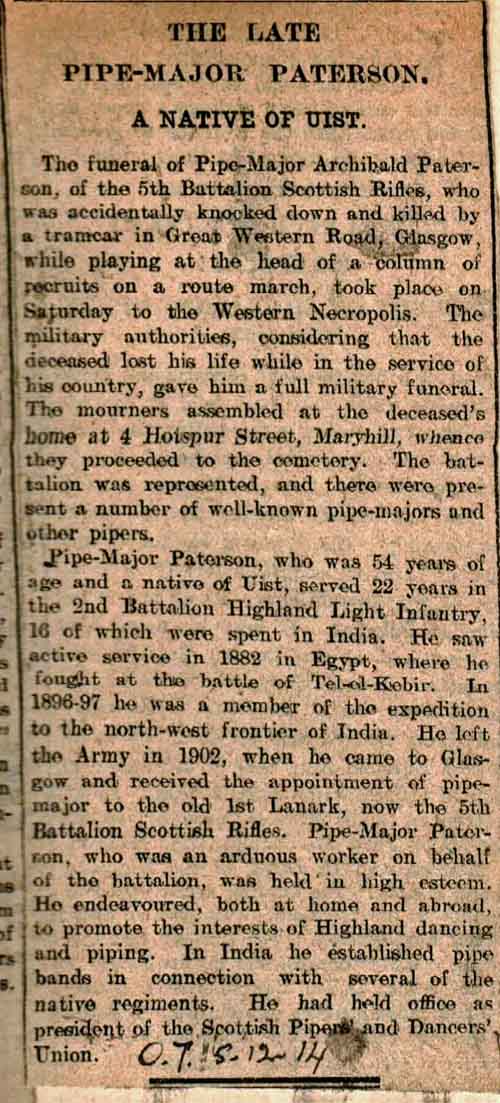Chanters silenced: two men of the Hebrides
We continue our series of historical records, mostly from the archives of the Oban Times, of pipers cut down in service in the Great War. As we approach the 100th anniversary of the end of four-year world struggle, we pay homage to the hundreds of pipers who gave up their lives.
The actual number of pipers who died in World War I is not known. There estimates that the final figure over the four years was close to 500. Here are only two, a piper of Tiree, not yet 19, killed in action, and a 54-year-old ex-pipe-major from Uist, killed in a freak accident on the streets of Glasgow while piping on young recruits about to go off to the battlefields. Ironically, the latter pipe-major served in Egypt and India and saw action in other battles, only to be struck down in his retirement.
 Previous installments to our Chanters silenced series:
Previous installments to our Chanters silenced series:
+ Chanters silenced: pipers lost in the Great War
+ Chanters silenced: pipers lost in the Great War – Angus Morrison, a heroic Uist piper killed
+ Chanters silenced: pipers lost in the Great War – losses on common ground
+ Chanters silenced: pipers lost in the Great War – G.S.’s brother and the youngest pipe-major
+ Chanters silenced – a pupil of John MacColl, heroes of Oban
We hope that you appreciate our series, and perhaps pause to reflect on the “cause” that they died for: the freedoms that we enjoy today, including piping and drumming.
TIREE MAN KILLED IN ACTION.
Piper HECTOR ROSS.
Since the commencement of the War, many promising young Highlanders have fallen, and many will regret to learn of the death of Piper Hector Ross, Gordon Highlanders, who was killed in action last month. He was only 18 years and 10 months, and enlisted at the outbreak of the War. He rejoined his regiment in December last after recovering from wounds received at the Battle of Loos on 25th September. His mother, Mrs John Ogilvie, 73 Lumsden Street, Overnewton, Glasgow, has received official notice of his death from headquarters and also a letter of sympathy from Lord Kitchener. The Rev. P.D. Thomson, Chaplain to the Forces, attached to the 1st Gordon Highlanders, has written the following touching letter to his mother: –
“Dear Madam, – It is with much regret that I have to inform you of the death of your son, Private H. Ross, of which you may have heard already from other sources. Early in the morning he went into action with his Battalion, charging with his Company to capture a German trench; and in the course of the engagement he was struck with a shell and killed. My purpose in writing is partly to convey my deep sympathy to you and all sorrowing friends, and partly to inform you of the arrangements for burial. Those killed in action were buried close by where they fell, so that your son is laid to rest in the goodly company of comrades. Whenever practicable, crosses marked with the name, rank, regiment, and date of death will be erected over their graves, which will be taken over whenever possible by the authorities and carefully tended in coming days in honour of the gallant dead. I earnestly trust that you may be sustained and comforted by the thought that your boy gave his life for a high and scared cause, and that he is numbered with those of whom our Saviour said – ‘Greater love hath no man than this, that a man lay down his life for his friends.’ May our Heavenly Father have you in His own gracious keeping.–With much sympathy, yours faithfully, P.D. Thomson, C.F.”
Piper Ross was a native of Cornaigmore, Tiree, and was a most promising youth. The sympathy of a large circle of friends goes out to his sorrowing mother.
A NATIVE OF UIST
The funeral of Pipe-Major Archibald Paterson, of the 5th Battalion Scottish Rifles, who was accidentally knocked down and killed by a tramcar in Great Western Road, Glasgow, while playing at the head of a column of recruits on a route march, took place on Saturday to the Western Necropolis. The military authorities, considering that the deceased lost his life while in the service of his country, gave him a full military funeral. The mourners assembled at the deceased’s home at 4 Hotspur Street, Maryhill, whence they proceeded to the cemetery. The battalion was represented, and there were present a number of well-known pipe-majors and other pipers.
Pipe-Major Paterson, who was 54 years of age and a native of Uist, served 22 years in the 2nd Battalion Highland Light Infantry, 16 of which were spent in India. He saw active service in 1882 in Egypt, where he fought at the battle of Tel-el-Kebir. In 1896-97 he was a member of the expedition to the north-west frontier of India. He left the Army in 1902, when he came to Glasgow and received an appointment to pipe-major to the old 1st Lanark, now the 5th Battalion Scottish Rifles. Pipe-Major Paterson, who was an arduous worker on behalf of the battalion, was held in high esteem. He endeavoured, both at home and abroad, to promote the interests of Highland dancing and piping. In India he established pipe bands in connection with several of the native regiments. He had held office as president of the Scottish Pipers’ and Dancers’ Union.
[Handwritten: O.T. 15-12-14]
Stay tuned to pipes|drums for more archive pieces on pipers who died in the Great War.


NO COMMENTS YET